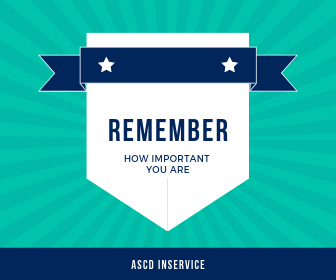Written by Erik Palmer
When teachers at Mission Viejo Elementary School came back from summer break, I was there. They wanted me to speak on the morning of the first day of work week. I have worked with hundreds of schools and districts across North America, and my presentation on how to teach students to speak well went smoothly until one slide came up. I got all choked up. Yes, I am prone to that, and my children will tell you that at big events, I often have to stop to collect myself. But this is the first time I got choked up during this presentation. You see, my grandson will be attending Mission Viejo kindergarten this year.
Here’s what happened: I put up a picture of my grandson and was suddenly hit by the enormity of the teacher’s task. These children aren’t data points. They aren’t 504’s or IEPs. They aren’t ADHDs or special eds or GTs or minorities or any other labels. They aren’t vessels to be filled, and they aren’t future test-takers to be groomed for the Big Test. They are someone’s child, someone’s grandchild.
Grandson Brayden is raw, innocent, vulnerable, and wonderful. I don’t know if he’ll be a great reader or writer or artist or mathematician or athlete or anything. All I know is that he is walking into school expecting great things. His mother is one of the sweetest people on the planet, and my son-in-law is a great father. They are watching their child walk into Mission Viejo fully expecting that he will be well cared for and well educated. Their level of trust is amazing: Here. You can have our child every day. He is precious. He is unique. We love him. We believe in you and want you to help him become even more amazing.
As teachers, we easily lose sight of the enormity of the task we have chosen. We get caught up with the minutiae of education, the forms, the meetings, the day-to-day problems, the new directives, and the new initiatives. At Mission Viejo, I was telling the teachers that we were going to undertake some important work this year, transforming the way all students speak. We tend to overlook the fact that students don’t speak well, and we go on about our other businesses. I said that I want all students to become better at life’s most important language art, oral communication. I want Brayden and all of his classmates to leave Mission Viejo able to speak well in every situation. I want them to be comfortable and confident communicators. That is important work. I think speaking well will be worth more to them than many other things we teach in school. But I don’t want any teacher to think, “I have to teach speaking.” I want all of us to remember that we have to improve the lives of the children entrusted to us. That is an incredible undertaking.
I had a principal who was good at spouting, “All of my decisions are based on the best interests of the students.” She used the phrase as a way of taking out other opinions: My decision is in the best interest of students whereas your opinion is selfish. She wasn’t concerned about kids as much as she was about being right, getting us to fall in line, and/or selling the new district mandate. But even so, my principal was paying lip service to the wrong idea. I don’t want what’s in the best interests of students. I want what’s in the best interest of young human beings.
There is a subtle difference there. Brayden is not just a student. He is so much more, and he is someone’s very special child. It is an awesome responsibility to realize that every being in your class has been sent to you by loving, hopeful, sometimes inept, concerned parents who believe you are worthy of crucial years of their child’s life. Every once in a while, step back and remember how important you are to children. Think about how noble and wonderful your job is. I bet you’ll get choked up, too.








